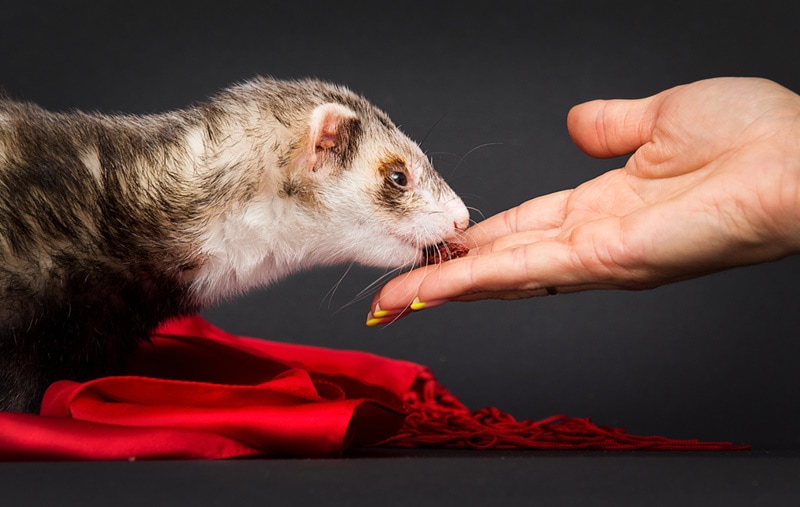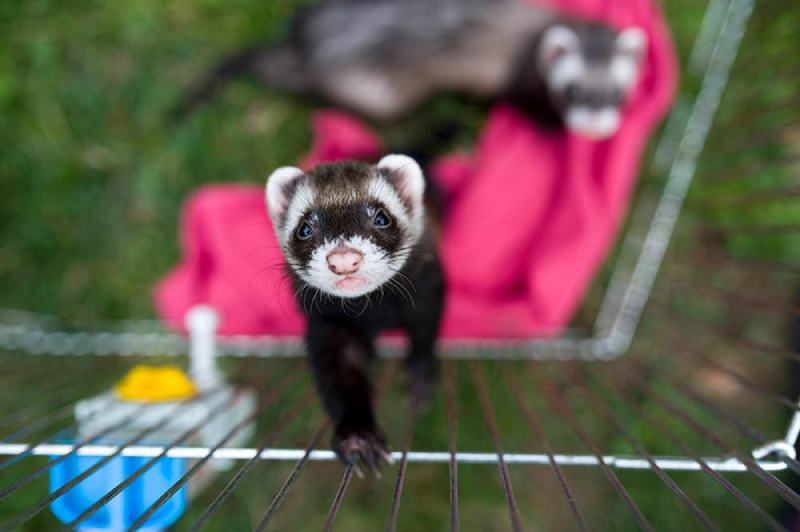How Much Is a Ferret at Petco in 2024? Updated Price Guide
Updated on
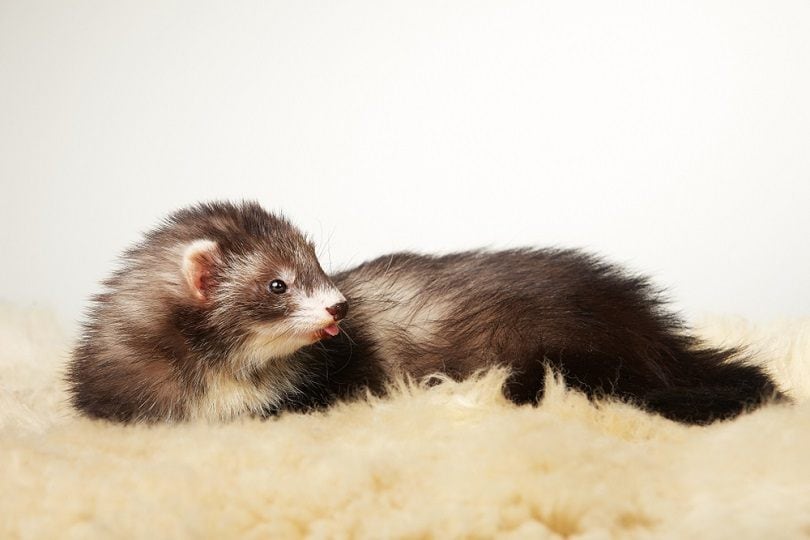
Click to Skip Ahead
On average, a ferret costs between $150 to $400 at Petco pet stores. The catch is that the exact price might vary based on where you live, plus the type of ferret you’re looking for can affect how much you pay. They don’t cost as much as the average dog, but ferrets can cost either a pretty penny upfront or relatively little depending on if you want a ferret with certain colorings.
Taking care of a ferret costs quite a bit more than just the cost of taking them home, of course! To help you get a more educated idea of what a ferret costs to take home, what supplies you’ll need, and about ferrets as pets in general, read on.
Are Some Ferrets More Expensive Than Others?
Yes, some ferrets have highly desirable colorings that make them correspondingly more expensive. On top of higher prices, you’ll have a harder time finding these rare-colored ferrets outside of major cities. If you’re interested in more specifics, check out the most sought-after ferret colors below.
- Black sable: $200 to $400
- Champagne: $100 to $250
- Albino: $100 to $200
- Blaze: $100 to $200
- Dalmatian: $150-$250
Are Ferrets Good Pets?
Absolutely! Ferrets are less popular than dogs or cats and present their own unique challenges, but with patience, they make excellent pets for the right owners. Ferrets have a whimsical, mischievous, and irresistible charm that new owners fall in love with every day. They’re ideal for apartment dwellers who want a more active pet than a cat but not one as demanding as a dog.
Despite appearing like wild possums, ferrets are, in fact, 100% domesticated and have been kept as pets for over 2,000 years. As small, lithe predators, they made natural rat catchers and could fit into rabbit burrows for small game hunting too.
At home, they love to play the jester and amuse you but have no trouble finding trouble to get into when left to their own devices. Ferrets are innately social critters that live in groups, which is why we recommend adopting two ferrets so they can have social interaction at times when you can’t give it to them. While ferrets can make fine solo pets, they’ll need plenty of one-on-one time with you to make up for the absence of a companion.
Another critical thing to know about ferrets is that they’re definitely among the smellier pets out there. Ferrets sold as pets are usually de-scented to mitigate this problem, but it’s not a perfect solution, and they tend to carry a musky odor. You can reduce this by keeping your ferret’s cage and bedding clean and by giving them regular baths with mild pet shampoo.
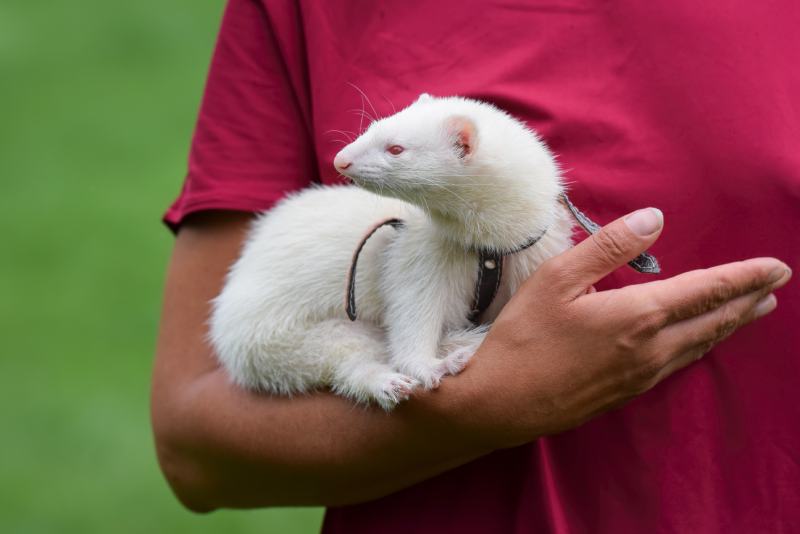
What Do I Need for a Ferret? Care Supplies & Equipment Explained
Ferrets are roughly as demanding as the average cat to care for, and like cats, you’ll need some basic equipment and supplies. These costs are highest upfront, leveling off within a few weeks. Let’s check off what you’ll need to care for your ferret after bringing them home.
- Cage: A single ferret needs a cage at least 2’ x 3’, and multiple ferrets need a cage even larger, so go with a wire cage with narrowly spaced bars and a removable bottom for easy cleaning.
- Entertainment: Ferrets are very playful and need plenty of toys to keep them occupied during the day. Exercise along with regular playtime will help keep your ferret from getting into mischief.
- Litter box: Litter training helps minimize ferret stink from accumulating. Choose a dust-free paper litter to reduce messes.
- Food: Ferrets need meat, whether it’s from actual cooked meat or an animal protein-based dry pellet formula.
- Water dispenser: Ferrets are infamous for tipping over water bowls, so save yourself the trouble and get one of those water bottle-style water dispensers often used with other mammals, like guinea pigs.
- Vet: Ferrets usually come de-scented, but if not, you’ll have to have that done by a qualified vet, as well as spaying or neutering and other miscellaneous health screenings.
Habitat Tips for Housing Ferrets
In the wild, ferrets live in underground dens and shallow underground burrows, sleeping 14 to 18 hours a day. Without a dedicated cage for them to call their own, your ferret will be drawn to dark spaces like underneath beds or furniture. Nip this in the bud by providing a quiet, comfortable cage they’ll love spending time in.
- Cover your ferret’s cage with a blanket to make them feel more at home.
- Keep a few favorite toys in their cage to keep them occupied when you’re at work or during their extensive rest periods.
- Avoid adding too much to the cage, as ferrets can get claustrophobic and prefer a wide open space of their own.
- Water bottle-style dripping dispensers are the easiest way to supply your ferret with water without the mess of a bowl. If you do go with bowls, choose one they can’t easily tip over.
- If possible, consider making your ferret’s cage part of a maze complex with perches, slides, and other fun physical obstacles that promote an active lifestyle.
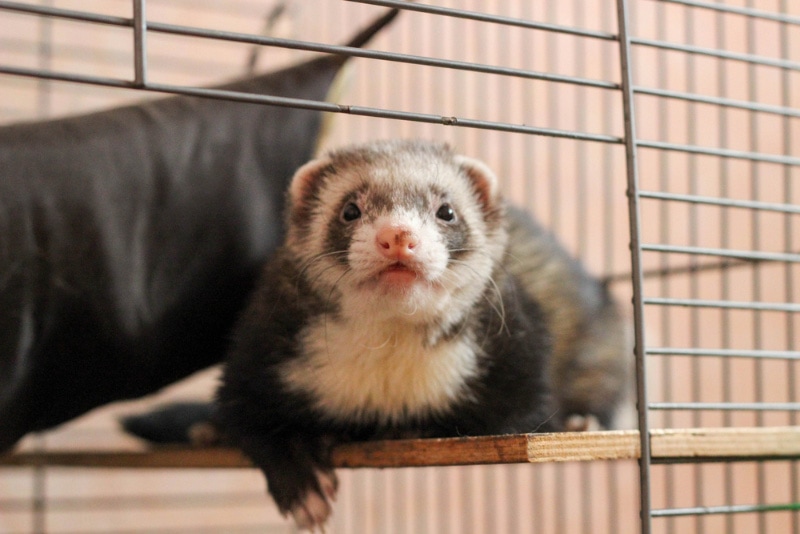
What Do Ferrets Eat?
Ferrets are carnivores that need very high protein content with a very lean portion of fat and minimal carbs, with some other essential nutrients like calcium. They can eat a lot of protein-packed foods, from lean meats, to energy-dense dried food specifically formulated for ferrets, and more. Let’s check those out below in more detail so you can better take care of your ferret.
- Lean meat: Think chicken, lamb, lean beef, rabbit, and wild bird meat. Meat should be fully cooked to minimize pathogens and shredded to help them chew it.
- Pellets: Ferret pellets are specially made with lean meats like chicken or lamb to satisfy their high metabolism.
- Eggs: Ferrets love protein-rich cooked eggs. Scramble them for a quick and tasty meal.
The Don’ts of Owning a Ferret: What to Avoid
Ferrets aren’t as straightforward as, say, a cat, so it can be hard to know what type of things you’re supposed to avoid when caring for them. To avoid some common ferret mistakes, review some of the most common just below.
- Don’t feed ferrets dog food, as it’s loaded with grains and carbs that are unhealthy for ferrets.
- Stay away from scented, dusty, powdery, or sandy litter materials. Recycled and shredded paper is the best.
- Never allow your ferret free rein in another room without supervision unless it’s a specially ferret-proofed room.
- Don’t let your ferret have unsupervised contact with young children to avoid potential accidents.
- Try to avoid bathing your ferret unless absolutely necessary or to clean hazardous chemicals. Baths with soap and water can strip away their natural skin/hair oils.
Conclusion
Ferrets are inquisitive and affectionate pets that require a bit more care than a cat, but their zany shenanigans are well worth the effort. They cost about $100 to $200 at Petco on average, varying by coat type and location.
Related Reads:
Featured Image Credit: Couperfield, Shutterstock

